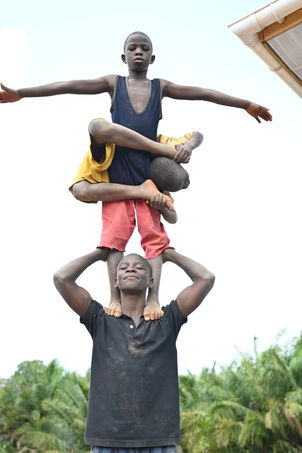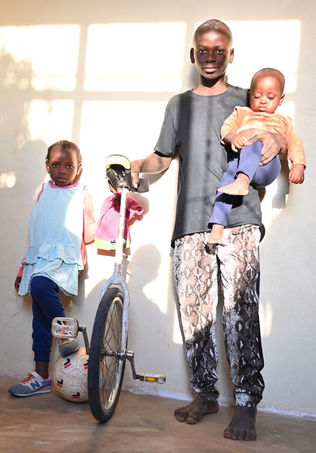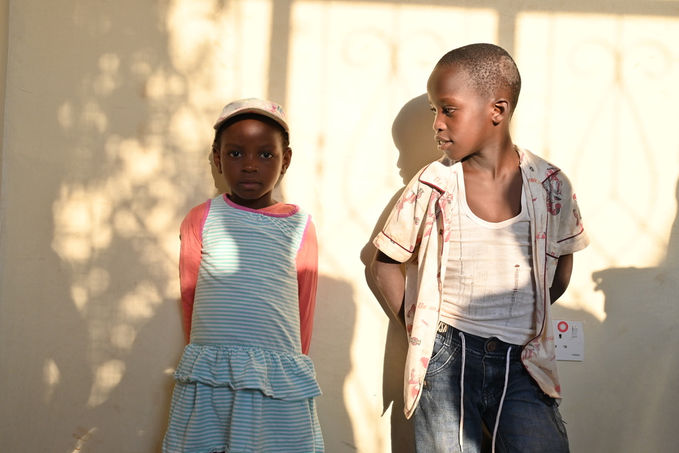Talents of Tanzania
Our Mission
At the House of Talents, we provide joy, community, and the possibility of a new calling through the art of acrobatics.
What We Do
The House of Talents is an acrobatics center for children in the region of Chanika, a village near Dar es Salaam, who are affected by poverty and isolation.
Our professional acrobats train with the children every day, teaching them new skills and encouraging their talents.
Whether they prefer juggling, balancing, or unicycling, we help kids to develop perseverance and discipline while finding confidence and joy.
By aiding children in becoming proficient acrobatic performers, we also provide new perspectives and economic avenues, as particularly talented and ambitious children may choose to pursue acrobatics and performing arts as a calling.
In addition, we also support their education by improving their reading and writing skills in English and Swahili and offering lessons on health, environmental issues, and culture.
Find out how you can help the young talents of Tanzania flourish >


The House of Talents
The House of Talents is a place that offers community, safety and joy. It welcomes all who want to partake in artistic activity.
The House of Talents contains an outdoor training area, a learning space, and a living space for the instructors.
At the moment, there are usually about three to four professional acrobats and trainers living at the house, working with the children, cooking meals, and taking care of the house. Learn more about our team >
The house and training area are still growing and require additional construction, improvements, as well as beautification.
The Art of Acrobatics
The art of acrobatics requires focus, perseverance, and trust. As the children learn to collaborate with each other and work regularly with our instructors, the children are made part of a community.
They develop greater physical strength, agility, and coordination while also learning to work towards a goal. Honing their skills and feeling that their talents are valued has a positive impact on their well-being and self-esteem.
What we offer is both a creative and joyful way of expression and the possibility of a viable career path in artistic performance.


Hardship and Hope
The House of Talents is located in Chanika, a very poor village in the outskirts of Dar es Salaam. The nearest shopping opportunity is about 4 kilometers away.
As a consequence of the poverty affecting the families of Chanika, many children don't have the opportunity to attend school regularly (or at all), as they are required to contribute to the household.
They are also often exposed to the consequences of poverty, like addiction and violence, and lack the stable home environment, attention, and care any child is entitled to. This affects their prospects for a more secure future.
This is why we don't just strive to provide these children a safe space for creative expression and joy; we also want to provide tangible opportunities by introducing them to the world of acrobatic performance as a calling.
Read more about one family's story >
Additional Sources
Consult this 2018 UNICEF Report on Child Poverty in Tanzania for more detailed information about the effects of child poverty, as well as the World Bank's report on the need to invest in Tanzania's girls and young women.
The Story of a Family
Fostering Talent
We have been working consistently with a group of four siblings who have shown great enthusiasm and aptitude for acrobatics. Their story illustrates the motivation behind our mission.
The two eldest siblings, Juma and Fadhili, have a talent for juggling and tower building, and love doing handstands and back-flips. Abdully, the third, is a contortionist: his body is amazingly flexible, allowing him to wrap himself around others as they try out new formations.
Swahumu, the only girl in the family, is very good at roller-balancing and seems to have even more strength than her older brother, Abdully. She has been practicing to perform a handstand on the top of the tower her brothers are building.
The Realities of Rural Poverty
Juma and Fadhili had to drop out of school due to their family's circumstances. They help the family survive. Abdully and Swahumu never went to school for the same reasons. The fifth and youngest sibling (who is too young to train with us) will likely face the same situation.
None of them can read or write their own names. This family of seven lives in one room that includes the kitchen, together with their ducks and chickens. They have no electricity or water. As they own no mattresses, they are used to sleeping on the floor. They also own very few clothes.
Their economic hardship is compounded by the fact that both parents struggle with alcoholism and cannot provide adequate care for their children. The children often eat only once a day or not at all.
Making a Difference
There are many families in the similar situation here in Chanika. Children like Juma, Fadhili, Swahumu and Abdully are not afforded the attention and care we would wish all children received, nor are they given opportunities that could lead to a future in which they do don’t have to struggle to survive – a future in which their talents are recognized, allowing them to thrive.
Heartened by these children’s motivation and talent, we provide them with a safe environment and a space in which they can focus and train while making sure they have food, shelter, and clothing.
We hope to accompany them all the way to their first stage performance, where their talents can not only spread joy, but open up new opportunities.








